Reader. Dreamer. Writer.
I felt 2018 was one of the best years in publishing. But January, 2019 has made me question my proclamation. The year has started with a blast, definitely! There were so many good releases that I am eagerly looking forward to the rest of the year.
Two books that I read in January and absolutely adored were late 2018 releases – Bombay Brides by Esther David about Indo-Jewish women in western India and Milk Teeth by Amrita Mahale, about the changing face of Mumbai in late 1990s. Both revolved around buildings and cultural nuances and were delightful reads.
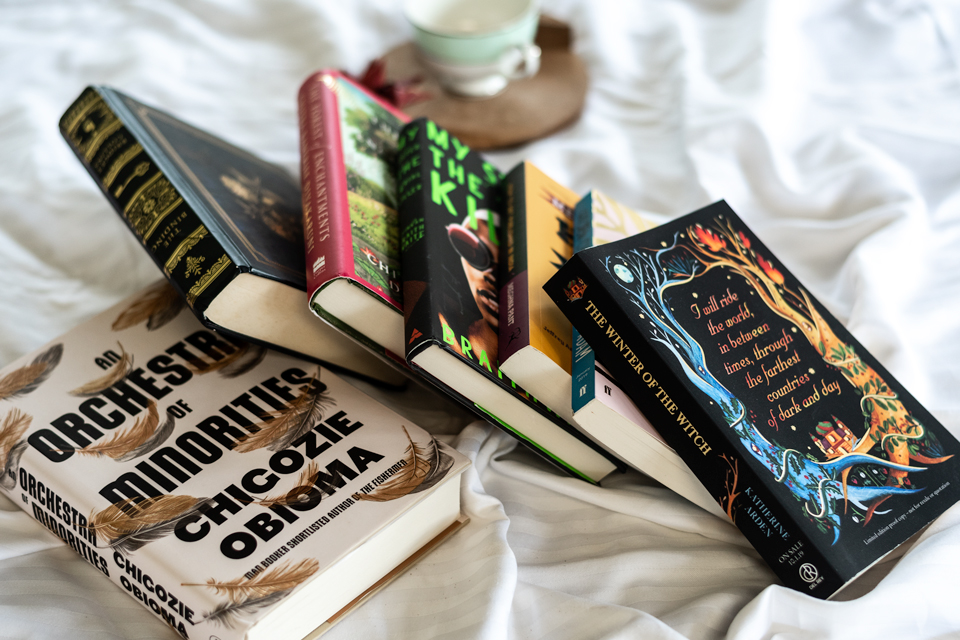
Talking of the present, here are some of the January releases that you should check out.
The Winter of the Witch by Katherine Arden
Katherine Arden’s Winternight trilogy came to an end in January, 2019. I’ve been following the books ever since the release of the first one, The Bear and the Nightingale, set in the woods of Rus’ in 14th century and brimming with Slavic myths. The second book, The Girl in the TowerA ‘perfectly imperfect heroine’, a frost demon & 5 reasons to read The Girl in the Tower had lesser myths and more action as Vasya grows into a feisty teenager and roams with her beloved horse, Solovey. The Winter of the Witch was a fitting end to the trilogy. It is a historical fantasy with real characters from the Mongol invasion and princes of Rus’ making an appearance. It is generously slathered with fairytale characters such as Baba Yaga, Koschei, the Deathless and more. I’ve been reading old Russian fairytales since I finished The Winter of the Witch and absolutely loving immersing myself in the folklore.
“Arden’s historical fantasy will leave snowdrifts in your heart and lure you to nuzzle against ancient magic. With vivid characters, mythical creatures and political schemes, this frosty fairy tale is one that you will yearn to return to every winter.” Read my whole review of the Winternight trilogy on Huffpost India where I described it as a ‘frosty fairytale of politics, spirits and war in old Russia.
Rating : 4.5/5
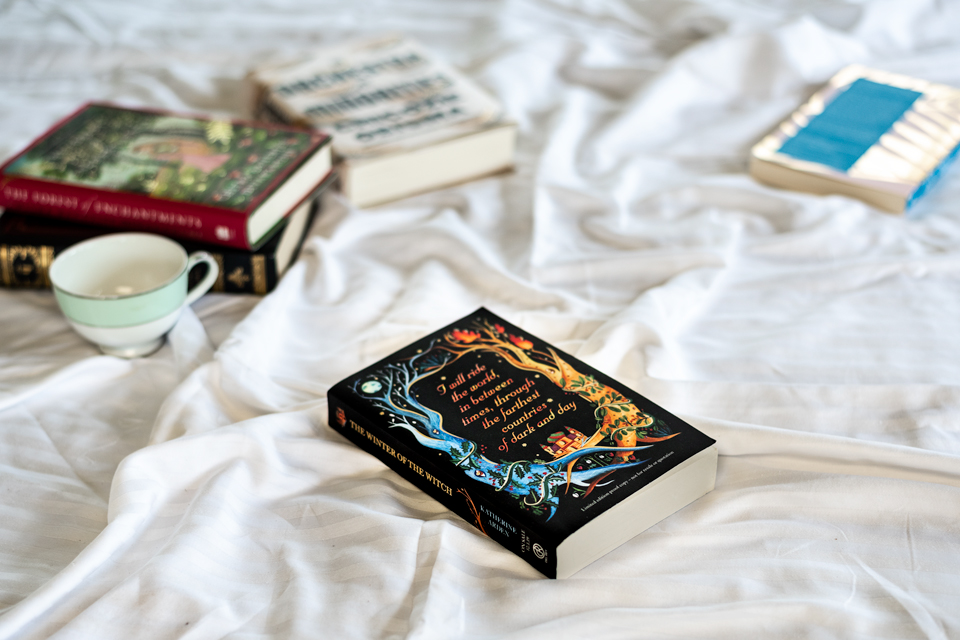
My Sister, the Serial killer by Oyinkan Braithwaite
I really enjoyed Oyinkan Braithwaite’s debut novel. It follows two sisters, Ayoola, the flirtatious beauty vixen who has a penchant for stabbing boyfriends and Korede, the protective older sister who cleans up the mess (aka corpses) of her younger sister. This was a glittering murder story with dead pan humour and chapters often as short as a single page. It is set in the modern age of hashtags going viral, Instagram selfies and Snapchat updates.
My Sister, the Serial Killer was fast paced. “It is trimmed with quotidian Lagos life through corrupt police officers, slipshod investigation, hospital employees with side businesses and older, rich, married men in want of younger girl friends” and dead bodies, of course. It touches the superficial life of Lagos only, nothing deep even in terms of character sketches, but is a compelling read that you will surely finish in a single sitting. Read my entire review of the book on Huffpost India : “A Murderous Beauty, her Loyal Sister and a Few Corpses”
Rating : 3.5/5
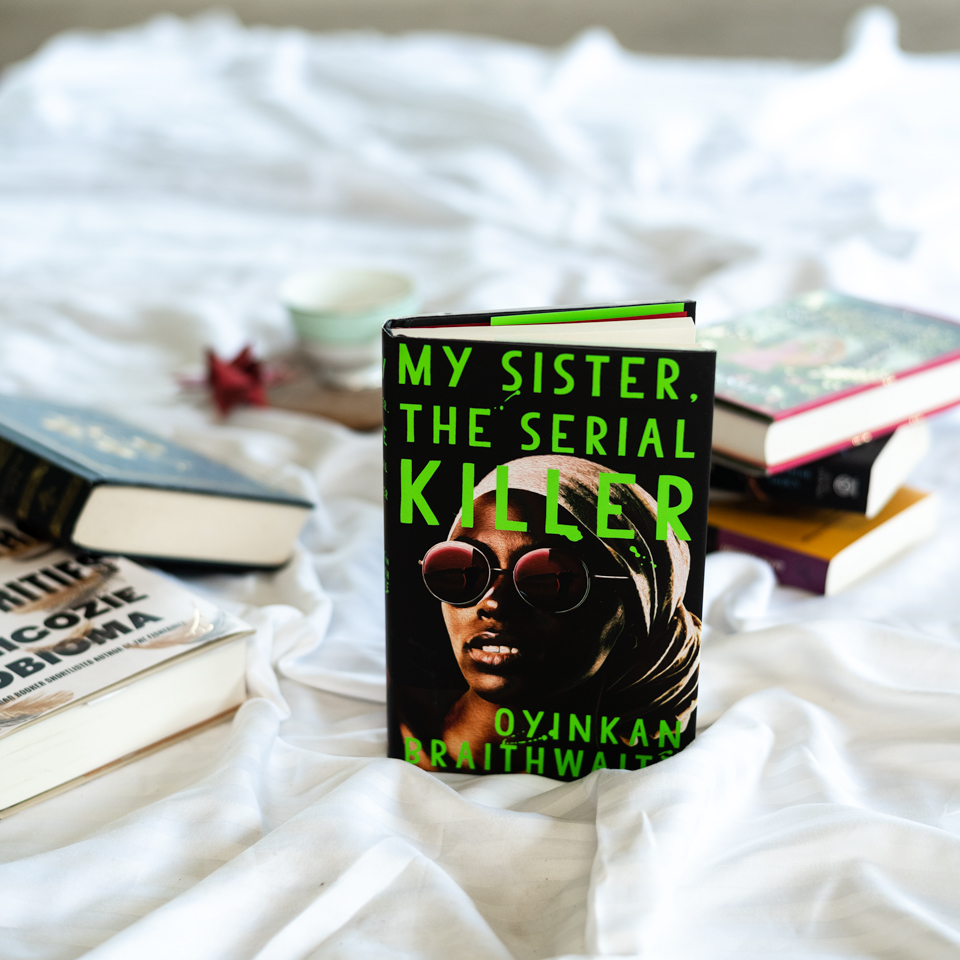
The Forest of Enchantments by Chitra Banerjee Divakaruni
Retelling myths from the female POV is a trend in Indian publishing. Two of my favourite retellings include Volga’s Liberation of Sita and Sharanya Manivannan’s portrait of Kodhai who becomes the revered Andal (my review of The Queen of Jasmine Country on Huffpost India). Kavita Kane’s books are also much loved with her POVs of female characters. Chitra Banerjee’s previous novel, The Palace of Illusions explores the story of Draupati, and the war between Pandavas and Kauravas.
The Forest of Enchantments was a beautiful retelling of Sita’s story in her own words. It was a magical concoction with the beautiful cover, stunning binding and lovely writing. It requires a good writer to breathe life into an age old story and captivate the reader. Sita takes the forefront in this story which was a delight and Rama’s progress onto Lanka through the bridge is shortened to a few lines only.
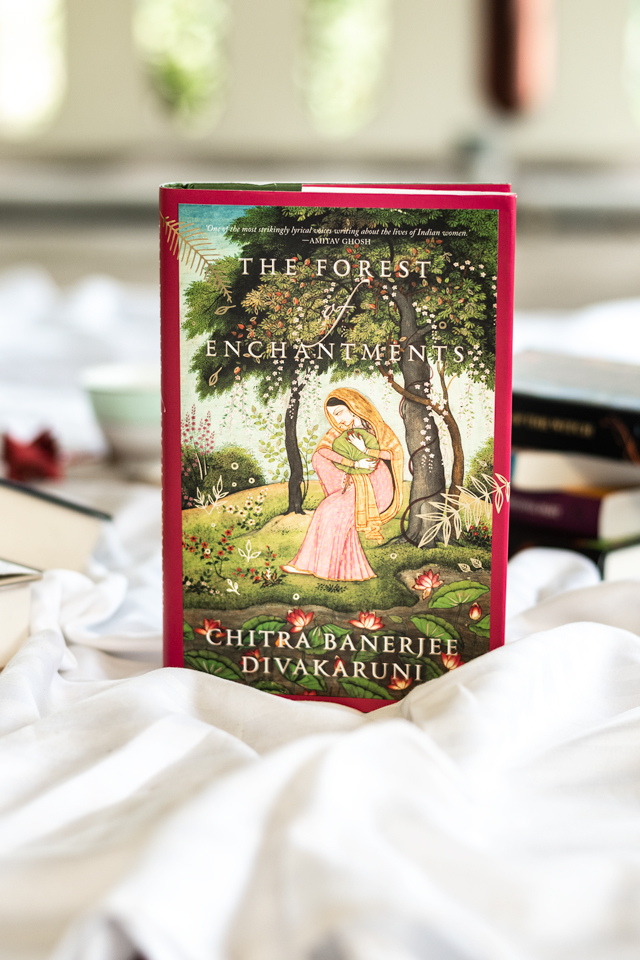
I was engrossed in the read till the last page. But it was different from what I expected. In Malshri Lal and Namita Gokhale’s In Search of Sita, Sita is explored as someone who stood form on her choices of not to have kids immediately (unlike the norms) but these decisions were not explored in depth in Banerjee’s retelling. Also there are other versions of Ramayana where Sita plays a more prominent role than Rama in her rescue from Lanka. I had hoped to see some parts of those versions but The Forest of Enchantments remains the popular story of Ramayana rather than something new through Sita’s POV. In many parts, the book reads as Rama’s story in Sita’s words. I had expected more grit in the parts about Sita choosing to leave Rama but the book did not do justice to the scene. However, the book does a good job on the version of Ramayana where Ravana and Sita are related. It gave a human touch to the demon Ravana which was impressive.
Don’t get me wrong – the book is a good one and I would recommend reading it. I loved my experience of reading it. But my expectations were higher since Sita is one of my favourite mythical characters and also because of my reading of Gokhale’s In Search of Sita. Either way, this is one of the best retellings of Ramayana out there.
Rating : 4/5

An Orchestra of Minorities by Chigozie Obioma
Chigozie Obioma’s second novel was a literary treat. It was deliciously slow story of one man as narrated by his guardian spirit and deeply rooted in Igbo cosmology. Obioma’s debut novel The Fishermen was a stunning one, so naturally I had high hopes for the second one about the poultry farmer, Chinonso.
An Orchestra of Minorities is one of my favourites of the year but it can be a hit or miss for you. There is little to the story other than one man being met with disastrous life events and how he tries to wriggle his way out of them. It was fascinating to read about guardian spirits and the set of rules they are bound to follow. They can’t see the future or interfere against a man’s will but can leave the host’s body.
“At heart, An Orchestra of Minorities is a familiar story of poor-boy-rich-girl-in-love, that relegates all other characters to the margins, almost like an epic about the poor Chinonso…it definitely makes a compelling read, dotted with the tiniest details of the mundane and streaked with white supremacy, glory of foreign lands and social ladders.” Read my whole review of the book on Huffpost India: A Poultry farmer fights for love.
Rating : 4/5
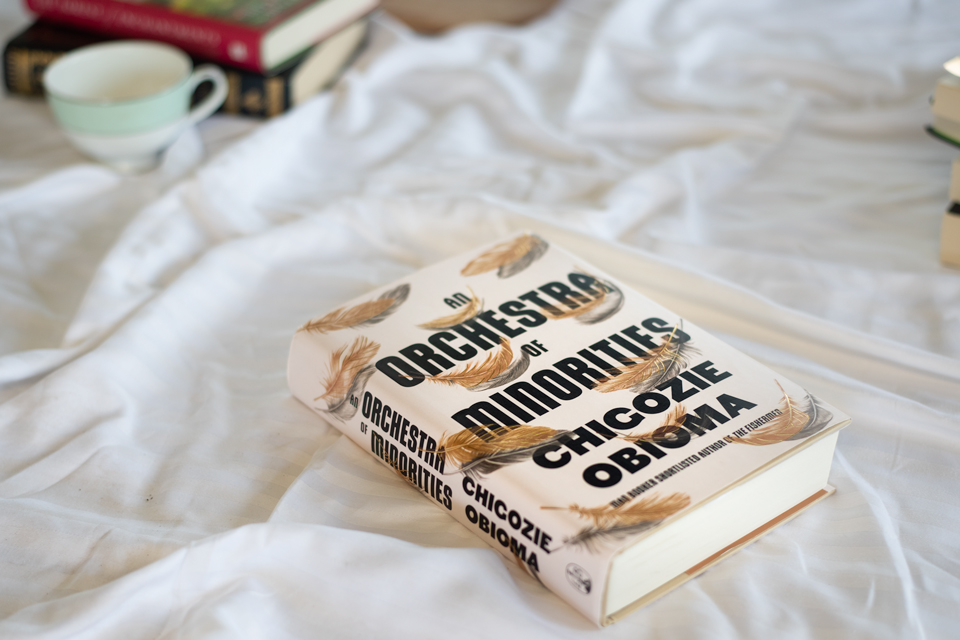
Golden Child by Claire Adam
Claire Adam’s debut set in rural Trinidad was a much hyped one for 2019. It is the story of an Indian family with twins, Paul and Peter. The father, Clyde, works exhausting shifts at a petroleum plant and the mother is a home maker. Paul is odd, socially and academically while Peter is a genius and . When Paul disappears one day, the family is met with impossible choices that will leave the family shattered forever.
The first few pages of the book were dull that I considered abandoning the read. But once Paul disappeared, the pace picked up and I began loving it. It becomes an emotional drama about parenthood faced with the burden of choices and dancing dilemmas. I was not convinced why one brother is called the ‘golden child’ when clearly the consequences that lead to the ending were heavy. I was unable to feel at ease with the title being handed over to one brother. However, Claire Adam successfully makes the reader wonder throughout the novel, and even after, whether any choices can be right, and sigh with relief that this happens in a book and not in the reader’s real life. The ending haunts you – I kept thinking about the novel and the family for many nights. They would appear every time I closed my eyes to sleep.
Rating : 3/5

The Binding by Bridget Collins
Hands down The Binding had the most stunning Advanced reading copy and the most stunning book cover ever! I really enjoyed following the marketing of the book on Twitter where they showed the inside scenes of printing the book. It was glorious! I think London bloggers were invited to an event where they could get hands on experience at book binding.
The Binding had the most captivating premise. It is a world where book binders are approached with suspicion and you can have your memories bound into a book to forget them. Binders are a rare breed and if you have the calling, you start out as an apprentice and learn the art. The book, divided into three sections, was mysterious in the first part. A boy who had enrolled as an apprentice finds a book with his name in the ‘library’. It is the book that will hold the secrets of what he has forgotten. The writing was atmospheric and dark and really captured my interest in the first section. But as the book progressed, I felt I was losing interest in the characters. It slowly transforms into a medieval romance and social commentary whereas I kept longing for a more ‘bookish’ story. While the premise was utterly enchanting and the reading quite immersive, the novel was not memorable for me. Pick it up if you are in the mood for reading a book about the art of books with a slight twist.
Rating : 3/5
How to get Published in India by Meghna Pant
A very handy guide to writers aspiring to get published in India. The book has a series of help articles from Pant from plotting to finally signing your contract. One of my favourites that focusses on publishing in India is Kissing the Demon by Amrita Kumar which is more of a step by step procedure about how to get writing. On the other hand Meghna Pant’s book is quite short in terms of the ‘writing process’. But it puts on paper the number of copies, expected revenue for a new author, commission rates and more. Pant has given examples from her own book (I liked this personal touch), so it was helpful to see the different kinds of synopsis, numbers that matter to a writer, query letters, approaching poetry vs fiction and so on. The book is like a Google search where everything you might need are mentioned in the pages, be it which literary magazines to submit to, writing workshops in India or email addresses of agents. The second half of the book includes helpful essays from different personalities in the publishing scene – a literary agent, best selling author, distribution manager, reviewer, self published author who became a best seller etc (yes, all famous names). It was such a lovely surprise to see Vivek Tejuja’s essay on reviewing books as well. While some essays were really informative, some were redundant and elaborated on similar points.

Even though this is a mini review, I have to point out two things that I disagreed with, in the book. I also asked other people’s opinions about the editing rates in the industry. So this is not coming just from me. Firstly, while I loved how Pant put out the numbers related to publishing, her rates mentioned for freelance editing were shocking. She says ‘While you can get editors for as less as 20 paise per word…try to work out a hybrid deal like 5 paisa per word for editing and 25 paisa for every correction’. She adds a disclaimer in the next sentence that the ‘your editor can make or break a book …don’t hand it over to someone because they are available and affordable’. The whole paragraph seemed misleading. These rates are not going to get you a polished manuscript and would probably ‘break’ the book. Also I am not sure how many hours a freelance editor with these rates would spend on your manuscript to polish it for the world. Interestingly, in Karan Bajaj’s essay the amount mentioned for editing is $3000. We can’t directly compare both the rates mentioned because the word count is not clear for Bajaj’s essay (might be 70K words while Pant is talking about a 350 page book). Also rates are different for foreign editors and India based editors and dependent on structural edits, line edits etc) but there is still a gap and this has not been addressed properly in the book.
Secondly, Pant talks about sending out a newsletter to potential influencers with something that might be useful to them, like writing tips or how to build a subscriber base, and to treat them as friends and not subscribers and thus build a relationship. This is an absolute NO. If you send out a random newsletter to an email address, you will either be blocked or reported as spam unless you know the author previously. I have seen letters that ask ‘confirm if you want to receive more emails’ (so you can just ignore if you don’t want any more) but it was not clear if Pant was talking about something in that direction. Getting blocked might actually be bad for you if you want to communicate on something else in the future. So I would not recommend this method but maybe it worked for the author and that is why she has mentioned it. Overall, I felt How to get published in India was a helpful book for those who want to know more about the publishing industry in India.
Rating : 4/5
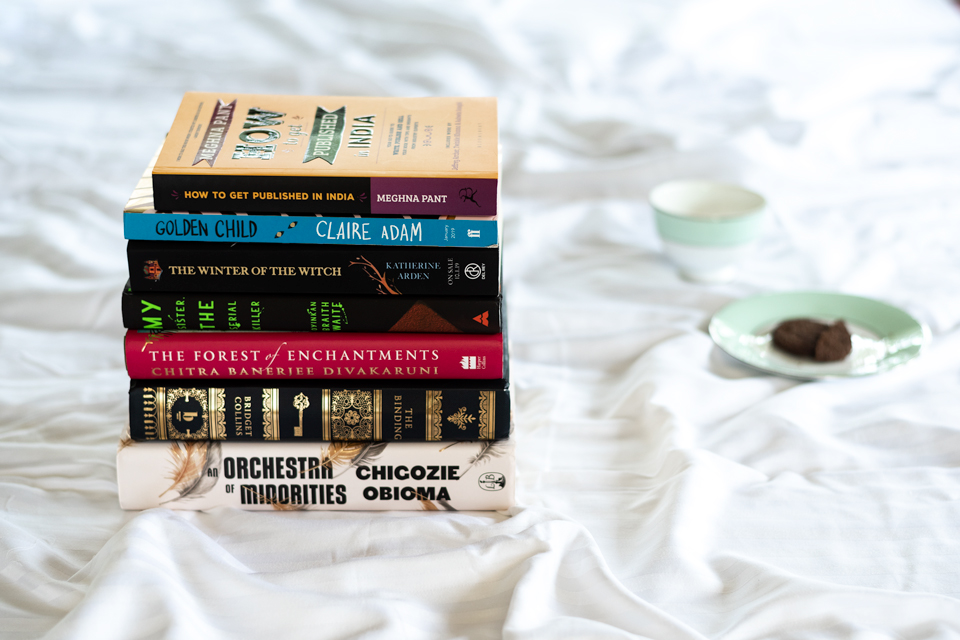
January was a blast for new book releases - Russian myths, twins, Igbo cosmology, Indian mythology, book binding, serial killers, publishing stories and MORE Click To Tweet Disclaimer : Much thanks to the publishers, Penguin (The Winter of the Witch), Atlantic (My sister, the serial Killer), Little Brown (An Orchestra of Minorities), Harper Collins (Forest of Enchantments, The Binding), Faber and Faber (Golden Child), Bloomsbury (How to get published in India) for sending me the books. All opinions are my own.










Adding more to the ever growing TBR
Oh goodness! All these books sound so interesting. I have to read My sister, the serial killer now. The title and premise is so intriguing.
My sister is an excellent read especially on trips. It is short and intriguing
All of these sound fabulous!
They were all enjoyable indeed
I have been wanting to read My Sister The Serial Killer for a while! It makes a change to read a thriller like that where the bodies are men. I get a little bit exhausted by the ever present literary dead girl. I’m glad it was a fun read for you 🙂
Oh yes! Definitely a fun read. It doesn’t go very deep into plot or characters and still managed to keep me glued to the pages
I must read The Bear and the Nightingale! Sounds like it’s just my thing:-)
I hope you will love it .
I downloaded it last night, and started immediately, so far so good
Awesome! This is good news!
Oh I just have to say i love your photography so much you are incredibly talented! eep! And I (probably not surprisingly since I’m mostly a YA creature haha) haven’t read any of these but I do have the first Katherine Arden book on my TBR…and wow that cover edition you have is gorgeous too!!
Thank you! I am sure you will love the Winternight trilogy Cait
I also read & LOVED The Winter of the Witch in January! It was the perfect ending to a wonderful series. I am sad that it is over, but excited to see what Arden gives us next!
I loved it too. And I really wanted more of Vasya and her world. But as they say better a perfect ending than a dragged one
I finished The Forest of Enchantments recently and totally loved it. Now that I am reading your review, I do get a few things that I missed but what can I say, I was totally engrossed in the story and the writing. The author’s writing is really beautiful. I am hoping to start the Winternight trilogy soon.
Yes, the writing was really captivating. I enjoyed it too. I hope you will love Katherine Arden
So glad you enjoyed winter of the witch! And I’m very curious about my sister the serial killer!
Do give it a try. My sister the serial killer is a very engaging read. You’ll be hooked
I loved Orch of Minorities and another English lang novel that centers on/includes Igbo beliefs that was good, but even darker, was Freshwater.
I am v keen to read Freshwater too. I think it will be shortlisted for women’s prize. So I am keeping it aside to read after that. Heard some raving reviews